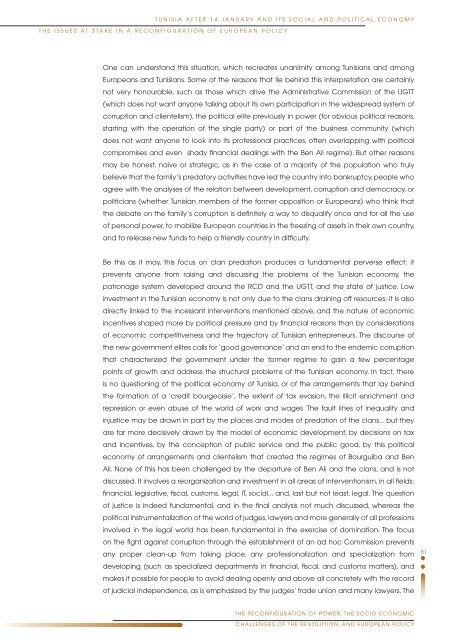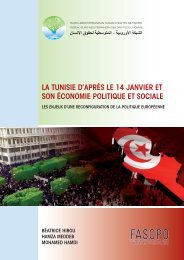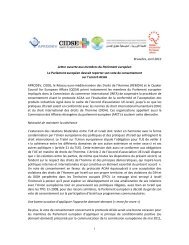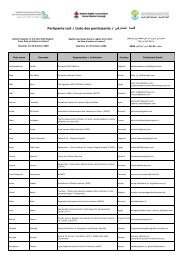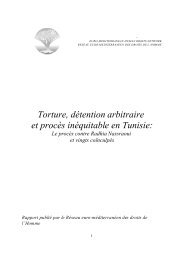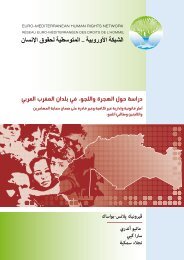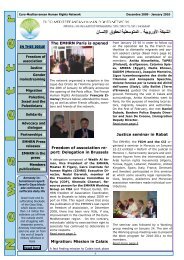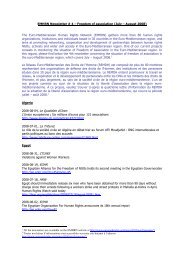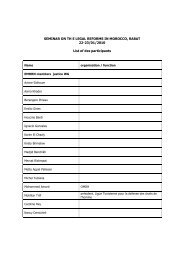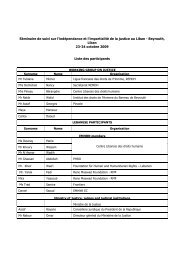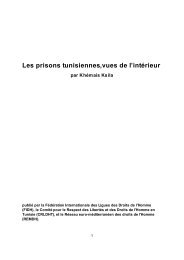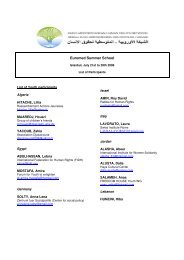tunisia after 14 january and its social and political economy - Refworld
tunisia after 14 january and its social and political economy - Refworld
tunisia after 14 january and its social and political economy - Refworld
Create successful ePaper yourself
Turn your PDF publications into a flip-book with our unique Google optimized e-Paper software.
T U N I S I A A F T E R 1 4 J A N U A R Y A N D I T S S O C I A L A N D P O L I T I C A L E C O N O M YT H E I S S U E S A T S T A K E I N A R E C O N F I G U R A T I O N O F E U R O P E A N P O L I C YOne can underst<strong>and</strong> this situation, which recreates unanimity among Tunisians <strong>and</strong> amongEuropeans <strong>and</strong> Tunisians. Some of the reasons that lie behind this interpretation are certainlynot very honourable, such as those which drive the Administrative Commission of the UGTT(which does not want anyone talking about <strong>its</strong> own participation in the widespread system ofcorruption <strong>and</strong> clientelism), the <strong>political</strong> elite previously in power (for obvious <strong>political</strong> reasons,starting with the operation of the single party) or part of the business community (whichdoes not want anyone to look into <strong>its</strong> professional practices, often overlapping with <strong>political</strong>compromises <strong>and</strong> even shady financial dealings with the Ben Ali regime). But other reasonsmay be honest, naive or strategic, as in the case of a majority of the population who trulybelieve that the family’s predatory activities have led the country into bankruptcy, people whoagree with the analyses of the relation between development, corruption <strong>and</strong> democracy, orpoliticians (whether Tunisian members of the former opposition or Europeans) who think thatthe debate on the family’s corruption is definitely a way to disqualify once <strong>and</strong> for all the useof personal power, to mobilize European countries in the freezing of assets in their own country,<strong>and</strong> to release new funds to help a friendly country in difficulty.Be this as it may, this focus on clan predation produces a fundamental perverse effect: itprevents anyone from raising <strong>and</strong> discussing the problems of the Tunisian <strong>economy</strong>, thepatronage system developed around the RCD <strong>and</strong> the UGTT, <strong>and</strong> the state of justice. Lowinvestment in the Tunisian <strong>economy</strong> is not only due to the clans draining off resources: it is alsodirectly linked to the incessant interventions mentioned above, <strong>and</strong> the nature of economicincentives shaped more by <strong>political</strong> pressure <strong>and</strong> by financial reasons than by considerationsof economic competitiveness <strong>and</strong> the trajectory of Tunisian entrepreneurs. The discourse ofthe new government elites calls for ‘good governance’ <strong>and</strong> an end to the endemic corruptionthat characterized the government under the former regime to gain a few percentagepoints of growth <strong>and</strong> address the structural problems of the Tunisian <strong>economy</strong>. In fact, thereis no questioning of the <strong>political</strong> <strong>economy</strong> of Tunisia, or of the arrangements that lay behindthe formation of a ‘credit bourgeoisie’, the extent of tax evasion, the illicit enrichment <strong>and</strong>repression or even abuse of the world of work <strong>and</strong> wages. The fault lines of inequality <strong>and</strong>injustice may be drawn in part by the places <strong>and</strong> modes of predation of the clans... but theyare far more decisively drawn by the model of economic development, by decisions on tax<strong>and</strong> incentives, by the conception of public service <strong>and</strong> the public good, by this <strong>political</strong><strong>economy</strong> of arrangements <strong>and</strong> clientelism that created the regimes of Bourguiba <strong>and</strong> BenAli. None of this has been challenged by the departure of Ben Ali <strong>and</strong> the clans, <strong>and</strong> is notdiscussed. It involves a reorganization <strong>and</strong> investment in all areas of interventionism, in all fields:financial, legislative, fiscal, customs, legal, IT, <strong>social</strong>... <strong>and</strong>, last but not least, legal. The questionof justice is indeed fundamental, <strong>and</strong> in the final analysis not much discussed, whereas the<strong>political</strong> instrumentalization of the world of judges, lawyers <strong>and</strong> more generally of all professionsinvolved in the legal world has been fundamental in the exercise of domination. The focuson the fight against corruption through the establishment of an ad hoc Commission preventsany proper clean-up from taking place, any professionalization <strong>and</strong> specialization fromdeveloping (such as specialized departments in financial, fiscal, <strong>and</strong> customs matters), <strong>and</strong>makes it possible for people to avoid dealing openly <strong>and</strong> above all concretely with the recordof judicial independence, as is emphasized by the judges’ trade union <strong>and</strong> many lawyers. The61The reconfiguration of power, the socio-economicchallenges of the revolution, <strong>and</strong> European policy


